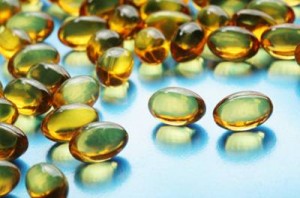HEALTH TIP
Healthy adults without any history of heart disease should eat fish at least twice a week.
SUPPORTING RESEARCH
More Information
Whether you are currently taking a fish oil supplement to increase your intake of heart-healthy omega-3 fats, or you’re thinking of taking a fish oil supplement, it’s important to know what to take before you swallow. Here’s a quick primer on how to spot a high quality fish oil supplement, how much to take, and what alternatives (if any) boast the same cardiovascular benefits. While there are multiple benefits for cardiovascular health associated with sufficient omega-3 fat intake, there is strong evidence that taking the recommended dose of omega-3 fatty acids may lower triglyceride levels.
When choosing a fish oil supplement, capsules are your best bet and they should be refrigerated for freshness. Be sure to choose a supplement made by a reputable company. Next, look for a product that contains ecosapentaenoic acid (EPA) and docosahexanoic acid (DHA).
• Healthy adults without any history of heart disease should eat fish at least twice a week (this provides 0.4-0.5g (400-500mg) EPA and DHA per day, or 1-2 fish oil capsules).
• Adults with coronary heart disease (narrowing arteries from atherosclerotic plaque build-up) should take 0.5g (500mg) each of EPA and DHA (1g total) daily to slow the progression of the disease (~4oz fatty fish every day, or 3-4 fish oil capsules).
• Adults with elevated triglycerides or high cholesterol need 2-4g (2,000-4,000mg) EPA and DHA for benefits seen in research (5-7 fish oil capsules twice daily).
Using fish oil with some medications or conditions can increase your risk of bleeding and stroke. Talk to your physician before taking any supplement.
If you’re a vegetarian, you can get omega-3s from plant-based alpha-linolenic acid (ALA), a precursor for EPA and DHA. 5g (5,000 mg) of ALA – the amount found in 1 tbsp flaxseed oil, 3tbsp of ground flaxseeds, or 2 oz walnuts – will be converted to 0.3-0.5g (300-500 mg )EPA and DHA in your body. You can also take an algae-derived EPA/DHA supplement using the same dosing guidelines as above for fish
Ref:Kris-Etherton et al. Fish consumption, fish oil, omega-3 fatty acids, and cardiovascular disease. Circulation. 2002;106:2747-1757.









